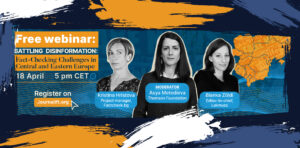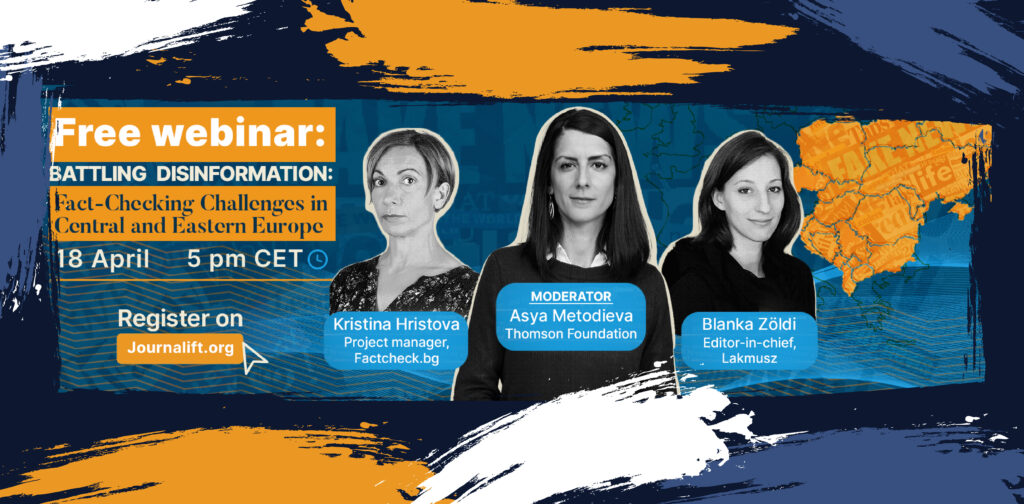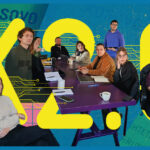There is one thing inherent to many professions: from doctors and lawyers, to journalists and different kinds of engineers. Most of them end up working in organizations run by people of the same profession. Most doctors end up working in hospitals run by doctors. Lawyers are to be found in legal help organizations or legal offices run by another lawyer. Engineers typically work in companies which require engineers (obviously). And guess what: those companies are typically run by another engineer.
The same goes with journalists: if you are in a journalist profession you are most likely working for another journalist (by profession or by professional nurture). Or, in this particular case, you might be the journalist other journalists work for. If this is the case, then we are writing this for you. If not now, then it will most probably be your case in the future and it is still worth your time. We believe so.
What is “mindset”?
According to Google dictionary, mindset represents “the established set of attitudes held by someone.” Cambridge dictionary defines it as “a person's way of thinking and their opinions”, while Merriam-Webster puts it as “a mental attitude or inclination.”
In other words, mindset is a sort of software of our mind with which we approach different situations, handle problems, resolve conflicts, take charge of change… Generally speaking, it pretty much defines what we are, who we are and how we do things.
As any software, and as the word itself says (mindset – mind-set), it needs setup and it can be updated. The setup and the update are continuous in theory – i.e. they are possible. However, often enough, at least in some areas, our mindsets remain fixed. It requires a conscious effort to make changes within your mindset.

Fixed vs. Growth mindset
According to American psychologist, Carol Dweck, a person's view of oneself is crucial: believing that your strengths and weaknesses cannot be changed is a typical representation of what Dweck calls fixed mindset. And thus, this fixed mindset affects everything you do in obvious ways. You simply remain on the course you’ve already taken as you believe nothing can be changed. It is like a vicious cycle: you don’t try to change because you believe it can’t be done and as a result you don’t change, you don’t grow.
However, Dweck recognizes another mindset – the so-called growth mindset. As she puts it in her own words, “in this mindset, the hand you’re dealt is just the starting point for development… this growth mindset is based on the belief that your basic qualities are things you can cultivate through your efforts.”
Therefore, a fixed mindset is a default, “a hand we are dealt”, “the starting point”. What we are going to do about it is our own responsibility, as long as we believe we can improve, we can change for the better.
Mindset is shaped by profession
Our mindsets are shaped by many things. Family we grow up in, sports we play, friends we spend time with, our loved ones, our professors, our colleagues… But nothing shapes our mindset as much as the profession we choose!
That is why we tend to understand people from our own profession in a more subtle way, we are able to communicate with them using codes, we share jokes which are not funny to anyone outside our profession, and we, when we are alone with our colleagues by profession, encourage one another to believe that we are the chosen ones, the profession of the smartest, the elite group, the untouchables.
And this last one, the belief in the superiority of our profession, is a prime example of our ever threatening fixed mindset. It is rather easy to fall in this trap: who, if not us, is the best fit to run our organization? Who, if not a doctor, is the best fit to run our hospital? Who, if not an engineer, is the best fit to run our construction company?
Who, if not a journalist, is the best fit to run our media outlet?
And yes, there are so many good arguments why it should really be like that. There are numerous irrefutable proofs that a journalist should be at the top of a media outlet/media house/agency… Those arguments are so strong that it might sound even funny to argue anything contrary to that.
But the idea of this article is not even to try it. Not even close.

Top is a lonely spot
Once you run an organization, a business, a non-profit… whatever you are by profession, it now goes in the background. It is of less importance. It usually helps you if your organization is within the boundaries of your profession. But that’s it.
What’s important, what needs to be put to the front is the fact that you are now a manager. A business manager (even in non-profit organizations).
You are no longer concerned with the quality of your article, timeliness of your information, or credibility of your sources… You are now concerned with the quality of EVERYONE’S articles, timeliness of EVERYONE’S information, credibility of EVERYONE’S sources... You are no longer in the business of building your career. You are now in the business of building EVERYONE’S careers, while maintaining the quality of service you (as an organization) offer, timeliness of the service you (as an organization) provide, and credibility of the service you (as an organization) represent. This spot, the top spot is a lonely place to be. Lonely places require us to adapt.
Your mindset now needs polishing. It does not require radical change. You are still a journalist and you can hardly do anything about it.
However, as you are now a manager you must add a managerial mindset. First of all, you need to be all about a growth mindset: believing that you can become better in certain areas which a managerial job requires. In other words, first you need to believe that you can add managerial mindset to your already established journalist mind.
Then you need to do something about it.
Companies tend to complain how they are unable to make engineers think like managers. Some media complain as well about their journalists for the same reasons. What we need is more journalists at the top thinking like managers.

Five minds of a manager
According to Jonathan Gosling, notable leadership professor, and Henry Mintzberg, one of the most influential management professors of Today, managers need different mindsets. As they put it:
“The International Federation of Red Cross and Red Crescent Societies, headquartered in Geneva, has a management development concern. It worries that it may be drifting too far toward a fast-action culture. It knows that it must act quickly in responding to disasters everywhere—earthquakes and wars, floods and famines—but it also sees the need to engage in the slower, more delicate task of building a capacity for action that is careful, thoughtful, and tailored to local conditions and needs.”
Fast-action culture, acting quickly in responding… Doesn't it ring a bell?
“Many business organizations face a similar problem—they know how to execute, but they are not so adept at stepping back to reflect on their situations. Others face the opposite predicament: They get so mired in thinking about their problems that they can’t get things done fast enough… Everything that every effective manager does is sandwiched between action on the ground and reflection in the abstract. Action without reflection is thoughtless; reflection without action is passive. Every manager has to find a way to combine these two mind-sets—to function at the point where reflective thinking meets practical doing.
But action and reflection about what? One obvious answer is: about collaboration, about getting things done cooperatively with other people... Another answer is that action, reflection, and collaboration have to be rooted in a deep appreciation of reality in all its facets. We call this mind-set worldly, which the Oxford English Dictionary defines as ‘experienced in life, sophisticated, practical.’ Finally, action, reflection, and collaboration, as well as worldliness, must subscribe to a certain rationality or logic; they rely on an analytic mind-set, too.”
Those are the five ways in which journalists running a media business (in further text: managers) should perceive the world and thus act upon it.
Having a reflective mindset is about self, knowing and understanding oneself. As authors of the concept say, “there can be no insight without self-knowledge.” Collaborative mindset is obviously about manager’s relationships, while analytical is about the organization as a whole and a systematic decomposition of activities (which is what analysis is all about). The context in which organization functions, the world surrounding organization is the subject of the worldly mindset. The last but not the least, in a way integrative mindset is the action mindset, as it gathers altogether – self, relationships, organization, and context – through the process of constant and never ending change.

Analyze-Act-Reflect-Collaborate-Understand Context-Repeat
And as the subtitle above suggests, this is what you, as a manager, do all the time. In the words of Gosling and Mintzberg:
“You analyze, then you act. But that does not work as expected, so you reflect. You act some more, then find yourself blocked, realizing that you cannot do it alone. You have to collaborate. But to do that, you have to get into the world of others. Then more analysis follows, to articulate the new insights. Now you act again—and so it goes, as the cloth of your effort forms.”
Once a manager of a media outlet, news agency, radio or tv station, or any other known form of media, it is no longer about you and it is no longer about the journalist in you. You are now expected to lead and to manage. Your responsibility now is about the survival of your media. This means making media that pays its bills. And it is a hard job. Tough and unforgiving industry filled with lots and lots of unhealthy competition, small profit margins and irregular working hours.
And above all, the idea, the striving towards independent journalism, the noble goal of independence. It is very hard to keep it all in balance. And within code of conduct.
On the other hand, nobody ever said it’s an easy job being a manager. However, to paraphrase Mintzberg, there is no more important job for our society than the job of a manager because managers decide whether our resources will be optimally allocated or wasted.
To repeat once again the same sentence: once you are a manager, it is no longer about being a journalist.
Once in the position, you have to be open to develop new skills and to allow yourself to become more than you thought you could be.
To put it differently, you need to embrace the growth mindset, as a general attitude towards the world surrounding you. And you have to develop all the mindsets preached by Gosling and Mintzberg.
Your reflective mindset requires you to reflect on a daily basis on:
- you and your own thoughts, decisions and actions,
- people around you and how they are affected by your thoughts, decisions and actions
- your organization and how it is affected by your thoughts, decisions and actions.
If you only reflect without action, your media is dead soon. Therefore, your position requires you to accept the action mindset: to push for change, in people, in the organization, in the world around you. You must act. To lead and to provide examples. And then reflect again. To change things next time. For the better.
Your job is also to analyze: what you did, how it was, what were the results, what could you change, how else could you act… And then act again. And then reflect again. To change things for the better next time.
While reflecting, acting, reflecting, analyzing, and again acting and reflecting, you need others as well and you need to understand and respect the world surrounding the organization. Organization is by definition a social entity. It is composed of other people. Not just you. You are responsible to organize their work and to make them work together and with you. You need collaboration and you need context understanding. You need a collaborative and worldly mindset.
You need all five of them. And you need them both separately and intertwined. Like golf clubs: one is not enough if you want to play it professionally and according to the rules, with full respect for the game. You need all of them as each one will prove to be useful in different situations. And sometimes you need a few of them, one after another.
To say it in the simplest form: you have to acquire the business mindset!
But hey! What do we know? We are just some professors of business pushing the idea of a business mindset…
































